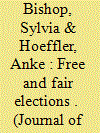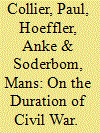|
|
|
Sort Order |
|
|
|
Items / Page
|
|
|
|
|
|
|
| Srl | Item |
| 1 |
ID:
146930


|
|
|
|
|
| Summary/Abstract |
The holding of elections has become universal but only about half of all elections are free and fair. Electoral malpractice not only distorts the quality of representation but has implications for political, social and economic outcomes. Existing datasets either provide information on election quality for a large number of elections but offer little detail, or they provide very detailed information for a small number of elections. Our data collection effort closes this gap by providing ten variables of election quality for all leadership elections for the period 1975–2011. We use these data to provide an assessment of elections that is closely tied to the commonly used term ‘free and fair’. We define ‘freeness’ of the election as the rules of the election and the process leading up to the election, and ‘fairness’ of the election refers to the events on the election day. Our data show that the quality of elections has declined over time. These electoral problems are mainly due to issues in the run-up to the elections. Using probit regressions we investigate the possible causes of election malpractice. Our analysis suggests that the freeness and the fairness of the elections are related to a number of variables, such as income, aid, executive constraints and the presence of election monitors, but that these variables have differential effects on freeness and fairness.
|
|
|
|
|
|
|
|
|
|
|
|
|
|
|
|
| 2 |
ID:
052693


|
|
|
|
|
| Publication |
Mar 2004.
|
| Summary/Abstract |
This article explores empirically the duration of civil war. It relates the duration of civil war to two alternative models of conflict and culls testable hypotheses from the case study literature on civil war. Using a comprehensive dataset on large-scale violent civil conflicts covering the 1960-2000 period, a wide range of hypotheses are tested by means of hazard function regressions. The results show that the duration of conflict is systematically related both to structural conditions prevailing prior to conflict and to circumstances during conflict. The key structural characteristics that lengthen conflict are low per capita income, high inequality and a moderate degree of ethnic division. The key variable characteristics that shorten conflict are a decline in the prices of the primary commodities that the country exports and external military intervention on the side of the rebels. Furthermore, the results indicate that the chances of peace were much lower in the 1980s and 1990s than they had been previously. Three empirical explanations are suggested as different approaches to civil war: rebellion-as-investment, in which the critical incentive is the post-conflict payoff; rebellion-as-business, in which the critical incentive is the payoff during conflict; and rebellion-as-mistake, in which military optimism prevents the recognition of any mutually advantageous settlement. The article concludes that the empirical evidence is incompatible with the first of these approaches but consistent with the others.
|
|
|
|
|
|
|
|
|
|
|
|
|
|
|
|
| 3 |
ID:
083245


|
|
|
|
|
| Publication |
2008.
|
| Summary/Abstract |
Post-conflict societies face two distinctive challenges: economic recovery and reduction of the risk of a recurring conflict. Aid and policy reforms have been found to be effective in economic recovery. In this article, the authors concentrate on the other challenge - risk reduction. The post-conflict peace is typically fragile: nearly half of all civil wars are due to post-conflict relapses. The authors find that economic development substantially reduces risks, but it takes a long time. They also find evidence that UN peacekeeping expenditures significantly reduce the risk of renewed war. The effect is large: doubling expenditure reduces the risk from 40% to 31%. In contrast to these results, the authors cannot find any systematic influence of elections on the reduction of war risk. Therefore, post-conflict elections should be promoted as intrinsically desirable rather than as mechanisms for increasing the durability of the post-conflict peace. Based on these results, the authors suggest that peace appears to depend upon an external military presence sustaining a gradual economic recovery, with political design playing a somewhat subsidiary role. Since there is a relationship between the severity of post-conflict risks and the level of income at the end of the conflict, this provides a clear and uncontroversial principle for resource allocation: resources per capita should be approximately inversely proportional to the level of income in the post-conflict country.
|
|
|
|
|
|
|
|
|
|
|
|
|
|
|
|
| 4 |
ID:
153501


|
|
|
|
|
| Summary/Abstract |
This article is concerned with explaining why peace endures in countries that have experienced a civil armed conflict. We use a mixed methods approach by evaluating six case studies (Burundi, East Timor, El Salvador, Liberia, Nepal, Sierra Leone) and survival analysis that allows us to consider 205 peace episodes since 1990. We find that it is difficult to explain why peace endures using statistical analysis but there is some indication that conflict termination is important in post-conflict stabilisation: negotiated settlements are more likely to break down than military victories. We also consider the impact of UN peacekeeping operations on the duration of peace but find little evidence of their contribution. However, in situations where UN peacekeeping operations are deployed in support of negotiated settlements they do seem to contribute to peace stabilisation.
|
|
|
|
|
|
|
|
|
|
|
|
|
|
|
|
|
|
|
|
|